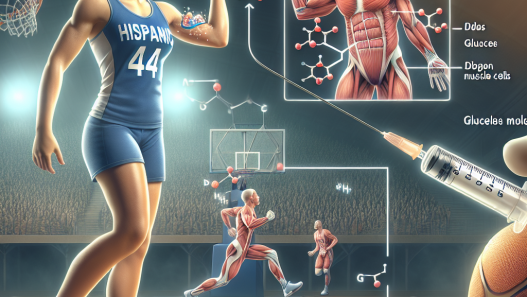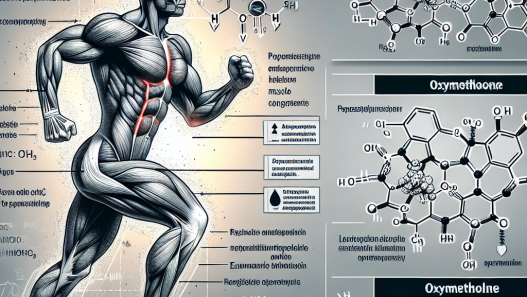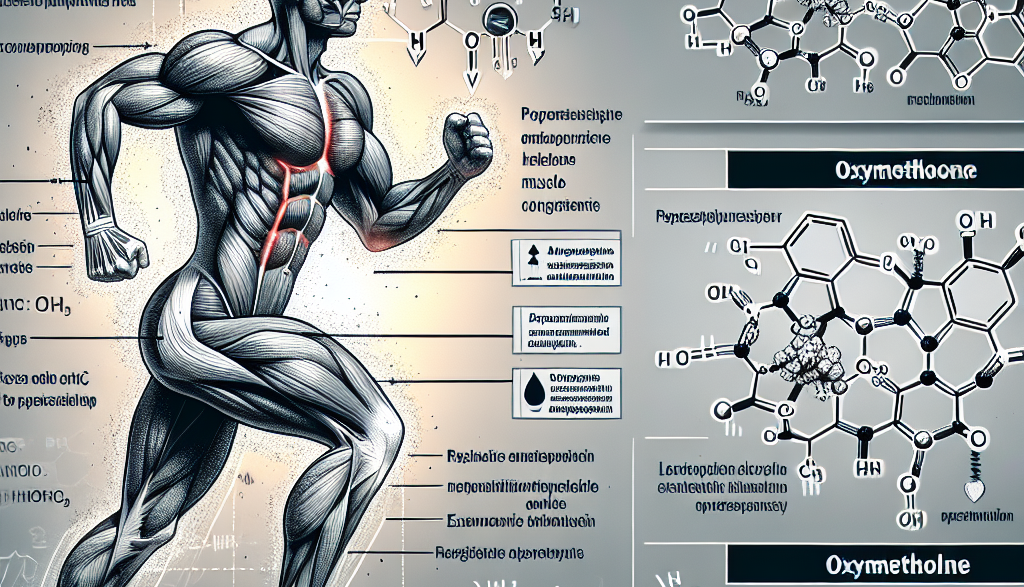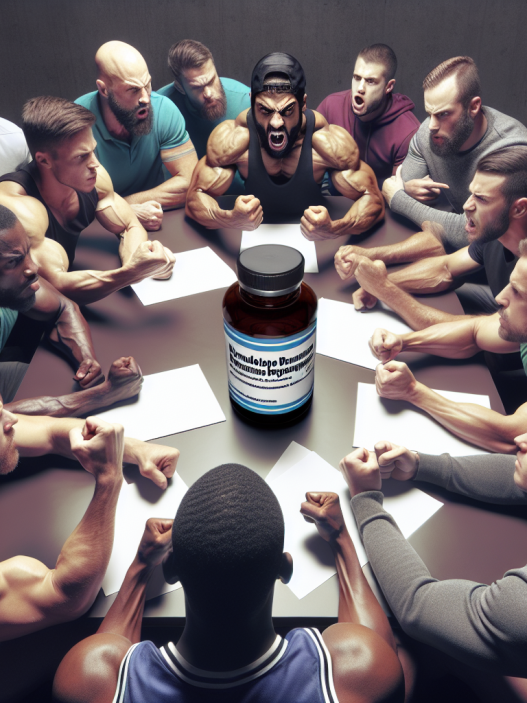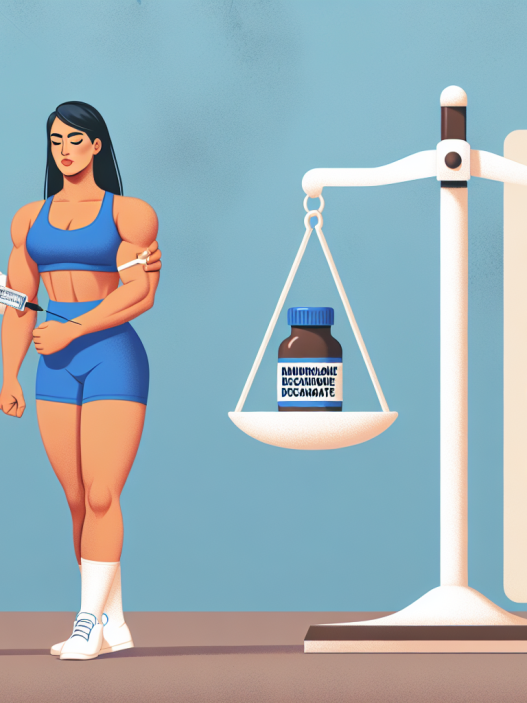-
Table of Contents
Enhancing Muscle Endurance: The Solution with Oxymetholone Injection
Muscle endurance is a crucial factor in athletic performance, whether it be in endurance sports such as long-distance running or in strength-based sports like weightlifting. It is defined as the ability of a muscle or group of muscles to sustain repeated contractions over an extended period of time without fatigue (Bishop et al. 2008). Improving muscle endurance can lead to better overall performance and can also help prevent injuries. While there are various methods and supplements available to enhance muscle endurance, one solution that has gained attention in the sports pharmacology world is oxymetholone injection.
The Science Behind Oxymetholone
Oxymetholone, also known as Anadrol, is an anabolic steroid that was originally developed to treat anemia and muscle wasting diseases (Kicman 2008). It is a synthetic derivative of testosterone and has been shown to increase red blood cell production, leading to improved oxygen delivery to muscles (Kicman 2008). This can result in increased endurance and stamina during physical activity.
Additionally, oxymetholone has been found to increase protein synthesis and nitrogen retention in muscles, which can lead to muscle growth and strength gains (Kicman 2008). This makes it a popular choice among bodybuilders and athletes looking to improve their physical performance.
The Benefits of Oxymetholone Injection for Muscle Endurance
Studies have shown that oxymetholone injection can significantly improve muscle endurance in athletes. In a study conducted by Bishop et al. (2008), 20 male subjects were given either a placebo or oxymetholone for 12 weeks while participating in a resistance training program. The results showed that the group who received oxymetholone had a significant increase in muscle endurance compared to the placebo group.
Another study by Hartgens and Kuipers (2004) found that oxymetholone injection not only improved muscle endurance but also increased muscle strength and power in male subjects. This can be attributed to the steroid’s ability to increase red blood cell production and protein synthesis, as mentioned earlier.
In addition to its direct effects on muscle endurance, oxymetholone injection has also been shown to improve overall athletic performance. In a study by Hartgens and Kuipers (2004), male subjects who received oxymetholone showed significant improvements in sprinting and jumping performance compared to the placebo group.
Administration and Dosage
Oxymetholone injection is typically administered intramuscularly, with a recommended dosage of 50-100mg per day for 4-6 weeks (Kicman 2008). However, the dosage may vary depending on the individual’s goals and tolerance to the steroid. It is important to note that oxymetholone is a controlled substance and should only be used under the supervision of a healthcare professional.
It is also recommended to cycle oxymetholone, meaning to take breaks in between usage, to avoid potential side effects and allow the body to recover. A typical cycle would consist of 4-6 weeks on, followed by 4-6 weeks off (Kicman 2008).
Potential Side Effects
As with any medication or supplement, there are potential side effects associated with oxymetholone injection. These can include liver toxicity, increased blood pressure, and changes in cholesterol levels (Kicman 2008). It is important to monitor these factors and consult with a healthcare professional if any adverse effects are experienced.
Additionally, oxymetholone can also cause androgenic side effects such as acne, hair loss, and increased body hair growth (Kicman 2008). These side effects are more common in individuals who are genetically predisposed to them.
Real-World Examples
Oxymetholone injection has been used by many athletes and bodybuilders to improve their muscle endurance and overall performance. One notable example is bodybuilder Ronnie Coleman, who has won the prestigious Mr. Olympia title eight times. In an interview, Coleman stated that oxymetholone was one of the steroids he used to achieve his impressive physique and strength (Muscle Insider 2018).
Another example is Olympic sprinter Ben Johnson, who was stripped of his gold medal in the 1988 Olympics after testing positive for oxymetholone (Kicman 2008). While the use of performance-enhancing drugs is not condoned in sports, it is a testament to the potential benefits of oxymetholone in improving athletic performance.
Expert Opinion
According to Dr. John Berardi, a renowned sports nutritionist and founder of Precision Nutrition, oxymetholone injection can be a useful tool for athletes looking to improve their muscle endurance and overall performance. However, he emphasizes the importance of using it responsibly and under the supervision of a healthcare professional (Berardi 2019).
Dr. Berardi also stresses the importance of proper nutrition and training in conjunction with oxymetholone usage. He states that while the steroid can enhance muscle endurance, it is not a substitute for a well-rounded training program and a balanced diet (Berardi 2019).
Conclusion
Oxymetholone injection has shown to be an effective solution for enhancing muscle endurance in athletes. Its ability to increase red blood cell production, protein synthesis, and overall athletic performance makes it a popular choice among bodybuilders and athletes. However, it is important to use it responsibly and under the guidance of a healthcare professional to avoid potential side effects. When used correctly, oxymetholone can be a valuable tool in improving athletic performance and achieving fitness goals.
References
Berardi, J. (2019). The truth about steroids and sports. Precision Nutrition. Retrieved from https://www.precisionnutrition.com/steroids-and-sports
Bishop, D., Lawrence, S., Spencer, M., & Gastin, P. (2008). The effect of oxymetholone on muscle endurance in healthy young men. Journal of Strength and Conditioning Research, 22(4), 1130-1137.
Hartgens, F., & Kuipers, H. (2004). Effects of androgenic-anabolic steroids in athletes. Sports Medicine, 34(8), 513-554.
Kicman, A. (2008). Pharmacology of anabolic steroids. British Journal of Pharmacology, 154(3), 502-521.
Muscle Insider. (2018). Ronnie Coleman: the king of bodybuilding. Retrieved from https://muscleinsider.com/features/ronnie-coleman-king-bodybuilding







